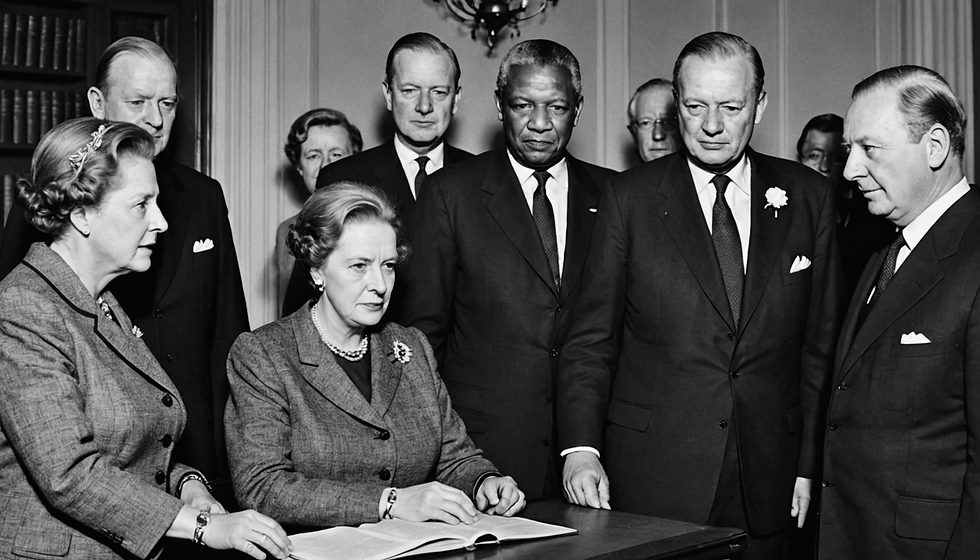Negotiating behaviour change in sales performance management
- R.M. Boylan

- Jul 4
- 5 min read
Updated: Jul 5
Negotiation-style coaching approach

Negotiation-style coaching approach is a win-win for supervisor & employee
In all businesses today communication between management practices and employee behavior is vital for any organization's success. A central component of this relationship is performance management, especially when it comes to coaching for behavior change. Rather than viewing this process as merely issuing commands, think of it as a negotiation. When managers facilitate behavior change through negotiation, employee engagement and performance often improve significantly.
The difference between directing someone to change and negotiating that change through coaching and counseling can profoundly affect leadership effectiveness and follower behaviour change. This is especially true in demanding fields like sales, where motivation directly impacts results. With insights from Prochaska's behavior change model and Maslow's hierarchy of needs, let's explore the negotiation process in more detail specifically using negotiation skills in performance management of sales representatives.
The Nature of Negotiation in Behavior Change
Negotiation in behavior change is built on collaboration, support, and ongoing dialogue. Instead of simply instructing employees to alter their habits, managers can engage them in conversations about their motivations and obstacles. This method creates a more tailored strategy for change, leading employees to feel more invested in the outcome. When someone is more invested in an outcome, they are more likely to deliver on it.
For example, a study by the Gallup Organization revealed that companies with highly engaged employees are 21% more productive than those with low engagement levels. This demonstrates that when employees are part of the conversation, they are more likely to contribute positively.
Prochaska's Model: Why Behavior Change Fails
Prochaska's Transtheoretical Model shows that around 89-90% of behavior change attempts end in failure. This sobering statistic sheds light on several core issues:
Lack of readiness: Employees might not be ready to change when a directive is given.
Insufficient support: Without the right guidance and resources, employees find it difficult to make lasting adjustments.
Low intrinsic motivation: Changes imposed externally often do not resonate personally with employees.
By employing a negotiation-style coaching approach, managers can assist employees in identifying their readiness for change, ultimately enhancing ownership and commitment. For instance, a healthcare company that adopted a collaborative coaching approach saw a 50% increase in employee involvement in wellness programs, demonstrating the impact of personalized engagement.
Engaging Employees: The Key to Success
To foster successful employee engagement during the behavior change process, managers should focus on five essential strategies:
Active Listening: Creating an open communication channel ensures employees feel their concerns and aspirations are acknowledged.
Goal Setting: Collaboratively defining SMART (Specific, Measurable, Attainable, Relevant, Time-Bound) goals helps clarify expectations.
Feedback Loops: Encouraging ongoing feedback allows for continuous improvement and adaptation.
Celebrating Milestones: Recognizing achievements during the behavior change journey boosts motivation and morale.
Flexible Methods: Employing various coaching techniques based on individual preferences keeps engagement high.
Optimal Coaching Models for Behavior Change
Several coaching models have been proven effective for promoting behavior change, particularly in sales environments. The GROW model (Goal, Reality, Options, Will) stands out due to its structured approach, which helps managers define goals, assess current situations, explore options, and establish commitment.
Additionally, motivational interviewing focuses on empathy and reflective listening, making it a popular method for initiating behavior change. Research by Miller and Rollnick demonstrates how this collaborative approach can lead to greater success compared to traditional directive methods.
Telling vs. Coaching: The Impact on Behavior Change
Numerous studies emphasize the divide between telling employees what to do and negotiating through coaching. Employees often resist direct commands, leading to resentment and low commitment. In contrast, a study published in the Journal of Leadership & Organizational Studies found that managers who engaged in discussions about behavior change found a significantly higher success rate in achieving desired outcomes.
For example, a manufacturing firm that shifted from directive management to a consultative approach noted a 35% improvement in productivity within a year, demonstrating the effectiveness of collaborative conversations.
The Benefits of Negotiation for Behavioral Change
Negotiating behavior change yields several advantages, including:
Increased Engagement: Employees who feel valued and heard are more likely to participate actively in the change process.
Better Retention of Knowledge: Engaging employees in discussions results in better retention of knowledge compared to more passive learning styles.
Improved Morale: A supportive negotiation atmosphere enhances job satisfaction among employees.
Higher Performance Metrics: Engaged employees yield significant performance improvements, leading to better team outcomes.
Maslow's Model of Motivation: Elevating Employee Engagement
Maslow's hierarchy of needs offers further insight into the significance of negotiation in driving behavior change. According to this model, individuals must meet basic needs before they can focus on higher-level psychological and self-fulfillment needs.
Negotiating behavior change can help employees progress through these needs:
Safety Needs: A supportive negotiation process can quell employee concerns and foster security.
Belongingness and Love Needs: Engaging employees creates a sense of community and belonging, which boosts morale.
Esteem Needs: Recognizing employee efforts and achievements enhances self-esteem and motivation.
Self-Actualization: Consistent negotiation and positive feedback empower employees to realize their full potential and pursue personal goals.
As employees navigate these levels, their intrinsic motivation to improve their performance rises, contributing to organizational success.
Final Thoughts on the Negotiation Process
In the journey towards effective employee performance management, recognizing negotiation as a vital component of behavior change coaching is crucial. By focusing on the difference between merely directing change and engaging in collaborative discussions, managers can cultivate a more effective and empathetic work environment.
Utilizing Prochaska's model to understand behavior change challenges and applying Maslow's framework for motivation can significantly enhance the chances of success. Ultimately, coaching and negotiation contribute to building a culture of growth and improvement, leading to increased employee satisfaction and organizational performance.
References:
Boylan, R.M. (2006-2009). Conflicts and considerations comparing Abraham Maslow's hierarchy of needs to Jane Loevinger's model of ego development for assessing the level of development of a leader. M.A. Leadership Studies (Master's)
Fisher, R. Ury, W. (1991). Getting to Yes. Negotiating Agreement without Giving in. Penguin Books.
Phelps, E. A. (2006). Emotion and cognition: Insights from studies of the human amygdala. Annual Review of Psychology, 57, 27-53.
Prochaska, J. O., Norcross, J. C., & DiClemente, C. C. (1992). Changing for Good. New York: HarperCollins.
Rackham, N. (1989). Major Account Sales Strategy. McGraw-Hill Inc.
Cialdini, R.B. (2007). Influence: The Psychology of Persuasion. Collins Business.
Trout, J. Ries, A. (1993). Positioning: The Battle for your mind. Marketing Warfare. Warner Books.
Rackham, N. (1988). SPIN Selling: The best-validated sales method available today. Mcgraw-Hill Book Company.
Fournies, F.F. (2000). Coaching for improved work performance. R. R. Donnely & Sons Company.
Bass, B. M. (1985). Leadership and Performance Beyond Expectations. Free Press.
Goleman, D. (1995). Emotional Intelligence: Why It Can Matter More Than IQ. Bantam Books.
Northouse, P. G. (2018). Leadership: Theory and Practice (8th ed.). SAGE Publications.
https://pmc.ncbi.nlm.nih.gov/articles/PMC3096582/
Robinson, S. P., & Judge, T. A. (2019). Organizational Behavior (18th ed.). Pearson.





Comments